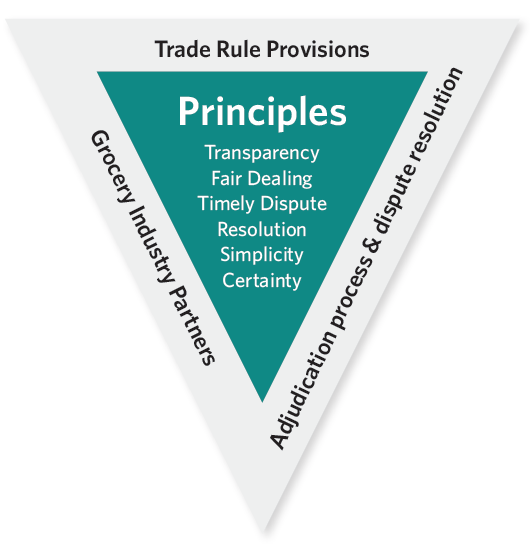It had been a subject of discussion and dispute for nearly four years, but in late June the Canadian Grocery Industry Code of Conduct finally became a reality, with the last major retailer holdouts (Walmart and Costco) finally signing on.
The Grocery Code of Conduct is a voluntary industry-led Code that applies to all retailers and suppliers and is intended to balance the supplier-retailer relationship and improve the transparency, predictability, and respect for the principles of fair dealing between suppliers and retailers. It was initiated in 2020 by the Federal, Provincial, and Territorial (FPT) Ministers to address “concerns of processors, producers, and independent grocers regarding increased retailer fees on suppliers and the need for balance in the supplier-retailer relationship, while also ensuring that Canadians continue to have access to a reliable grocery supply at affordable prices.” It is intended to address the needs of small and medium establishments as well as large, international companies.
The Code is not a single document. Rather, it is made up of principles, a governance, adjudication and dispute resolution process, and trade rule provisions supported by clear definitions. The four principles of the code are:
- Transparency and Certainty in commercial dealings to help avoid ambiguity through clear Agreements that define conditions for communications between the Parties and terms for payments, fees, and other obligations.
- Fair Dealing Across the Value Chain with it being expected that all retailers, suppliers, and wholesalers – large or small – act in good faith and deal fairly and ethically, including providing reasonable notice and communicating in sufficient detail and in an effective format. While the code doesn’t limit competition, it does require that a decision made by a supplier to not accept a retail order or a retailer to materially change an order provide an explanation that enables the other party to understand the basis for the decision. The code also limits the ability of either party to impose fines or penalties on the other due to a non-issued or non-accepted order.
- Timely Dispute Resolution. With a goal to enable effective, equitable and timely resolution of disputes, all aspects of an issue are to be considered, pursuant to the Dispute Resolution Management Process (DRMP) as outlined in the governance model.
- Simplicity. The Code should be easy to understand and comply with, favouring simplicity and fairness over detailed rules and unnecessary complexity.
As such, the code is a system, defined by a set of principles, the trade rules and Code provisions. It is to be governed by the membership-based, not-for-profit Grocery Code Adjudicator Office (GCAO) which will oversee the grocery industry’s performance against the Code. An annual report will be published that tracks progress against key metrics and strategic objectives, illustrates any differences the Code has made in the supplier-retailer relationship, and provides financial information.
Although the Code has been finalized, with an implementation goal of June 2025, a July report from the interim board of directors notes that there is still much work to be done, including the development of processes to ensure the efficient, effective implementation and funding. The funding, for which a request has been made to the FPT Ministers is needed to set the “necessary building blocks” to enable it to recruit members and generate the funds to be self-sustainable.
Although there was holdout by some major retailers who saw the Code as increasing regulatory burdens and potentially limiting their ability to negotiate supplier terms and maintain low prices, the Code, which was developed through consultation with various stakeholders and informed by similar codes in other countries, has been lauded and welcomed by most of the related industry groups and the Canadian government.
With the Code having been initiated in November 2020 – the height of the COVID-19 pandemic supply issues – it is possible that many more years could have gone by without changes had the pandemic not occurred and the supply chain not been so impacted by disruptions and shortages. But with significant change often requiring an instigation, perhaps the Code is one of the admittedly few positive results of the pandemic.
TAG Canada is very supportive of this initiative because it brings more transparency and accountability to both grocery product manufacturers and retailers. This has many benefits including those in the areas of food safety, quality, and consumer protection.
All content in TAG articles, newsletters, and webpages are developed and written by TAG experts, not AI. We focus on the realities and the science to bring you the most current, exacting information possible.





